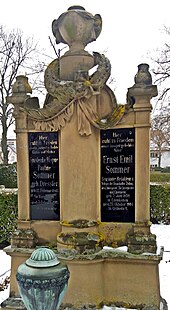Emil Sommer (publisher)
Emil Sommer (born June 7, 1838 in Edenkoben , † October 25, 1904 in Grünstadt ) was a German newspaper editor and publisher .
Live and act
He was born in Edenkoben in 1838 as the son of the lottery taker Elias Sommer (1804–1862), who converted from Judaism to the Protestant faith, and lost sight at the age of eight due to typhus . At the age of 16 he invented an apparatus for blind printing and writing. One of his teachers in Edenkoben was the later professor Eugen von Lommel , who lived there . Since blind people were not accepted at German universities at the time, Sommer attended the universities in Nancy and Paris from 1862 onwards . Here he studied chemistry and other natural sciences. He also acquired a great deal of expertise in viticulture. His treatises on vine growing and grafting were widely recognized. At the same time, he conducted intensive language studies in French, English, Italian and Spanish, which he soon mastered fluently and also taught in private.
Emil Sommer married Pauline Dressler (1845–1903) from Kaiserslautern in 1870 .
In 1876 he initially ran a bank and securities business in Edenkoben . In 1877 he founded three foreign-language magazines for Germans there, which were to be both entertainment and teaching journals. It was the French "L´ Interprète" , the English "The Interpreter" and the Italian "L´ Interprete" . They received an unexpected response. Since he did not want to be dependent on outside companies, Emil Sommer, with the help of his wife, set up his own printing and publishing house in Edenkoben from 1878. Here he already employed several people, including a. also two foreign linguists. One of them was Carlo Kahapka from Verona , the one in Edenkoben, under the title “Memoirs of an Austrian Craftsman. (1876–1880): Self-experienced and self-told by a typesetter ” , also published his eventful life story to date.
In order to expand the company further, the owner decided to publish a German daily newspaper. He moved his company to Grünstadt and from 1886 published the "Grünstadter Zeitung" there , which, in the absence of any other local newspaper, developed quickly and practically held a monopoly in the Leininger Land for the next 50 years or so . It was politically and religiously neutral.
In 1904, when Emil Sommer died, his eldest son Eugen Sommer (1876–1961) became head of the company. In 1907 he had the new residential and publishing buildings built on the corner of Sausenheimer and Kirchheimer Str. And expanded in 1924 and 1927 respectively. The "Grünstadter newspaper" , he published continue until its ban by the Nazi government in 1934. She lived in 1945 briefly, but was of the reorganized competition from the Rheinpfalz not withstand. The "Verlag Emil Sommer" existed as a book publisher until 2006.
Emil Sommer and his wife were buried in the Grünstadt cemetery, the lavish tomb has been preserved there. The “Grünstadter Zeitung” is fully archived in annual volumes at the city administration and in the city museum and is now a valuable source of regional history.
Another son of the couple was the long-time Treuchtlinger Mayor Emil Sommer (1885-1936), who was expelled there in 1933 because of his half-Jewish descent.
Printer grasp , essay from the former courtyard gate of the book printer, 1907
literature
- Walter Lampert: 1100 Years of Grünstadt , Emil Sommer Verlag, Grünstadt, 1975, p. 385
- Viktor Carl (Ed.): Lexicon of Palatinate Personalities , Hennig Verlag, Edenkoben 2004, ISBN 3-9804668-5-X , p. 834
- Festschrift 75 Years of Book Printing and Publishing Emil Sommer , Grünstadt, Grünstadt, 1953
- Edmund Strutz: German gender book: genealogical manual of bourgeois families; Sources and compilations with lineages of German bourgeois genders , Volume 208, Verlag Starke, 1998, p. 29, ISBN 3798002088 ; (Detail scan)
- Gert Hagelweide: Literature for the German-language press , Volume 20: Newspaper and magazine title register; Register of Prints and Publishers; Directory of printing, publishing and distribution locations; Complete directory , Verlag Walter de Gruyter, 2007, p. 455, ISBN 3110923645 ; (Digital scan)
Web links
Individual evidence
- ^ Edmund Strutz: German gender book: genealogical manual of bourgeois families; Sources and compilations with stem sequences of German bourgeois genders , Volume 208, Verlag Starke, 1998, p. 29, ISBN 3798002088 ; (Detail scan)
- ↑ Adolph Blankenhorn : Annalen der Oenologie , Volume 1, Heidelberg, 1870, pp. 91–94; (Digital scan of an oenological treatise in summer)
- ↑ Monthly reports of the fruit, wine and Horticultural Section of the Moravian Society for the Promotion of Agriculture, Natural and Regional Studies , Brno, 1872, p. 27 u. 28; (Digital scan)
- ↑ Advertisement in the Pfälzer Zeitung , Speyer, No. 155, of July 7, 1870
- ↑ Pfälzer Zeitung , Speyer, No. 13, of January 17, 1876; (Digital scan of an advertisement)
- ↑ Anton Durstmüller, Norbert Frank: 500 years pressure in Austria: The Austrian graphic trade between Revolution and World War I, 1848-1918 , Main Association of the Graphic enterprises in Austria, 1985, Volume 2, page 55, ISBN 3851045009 ; (Digital scan)
- ^ Klaus Bergmann: Life story as an appeal: Autobiographical writings of the 'little people' and outsiders , Springer-Verlag, 2013, p. 204, ISBN 3663143708 ; (Digital scan)
- ^ Paul Wentzcke, Gerhard Lüdtke: Archives: Archives in the German-speaking area , Edition 2, Volume 1 (A – N), Verlag Walter de Gruyter, 1974, p. 375, ISBN 3110817497 ; (Digital scan)
- ^ Website of the city of Treuchtlingen on Mayor Sommer
| personal data | |
|---|---|
| SURNAME | Summer, Emil |
| ALTERNATIVE NAMES | Summer, Ernst Emil |
| BRIEF DESCRIPTION | German publisher and newspaper editor |
| DATE OF BIRTH | June 7, 1838 |
| PLACE OF BIRTH | Edenkoben |
| DATE OF DEATH | October 25, 1904 |
| Place of death | Grünstadt |






